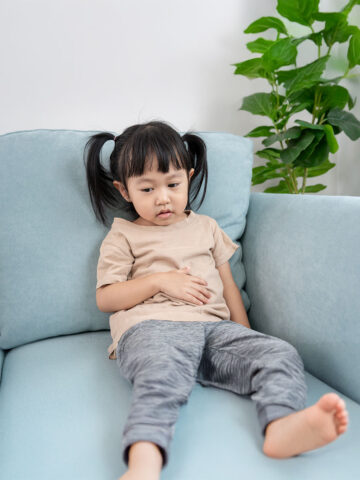In addition to a first-aid kit, a well-stocked family medicine cabinet can help families contend with a variety of ailments that children of all ages – and adults alike – might experience.
Here, Dr. Jonathan Auth, a pediatrician in CHOC’s primary care network, lists the essential elements of a family’s medicine cabinet.
What families should have in their medicine cabinet
Oral medications
- Acetaminophen. Frequently known as Tylenol, this common over-the-counter medication is a first-line defense against fever and pain. He recommends that families stock children’s acetaminophen rather than anything labeled as for infants. Though they used to differ in concentration, formulas are now the same, and children’s versions are typically less expensive than those marketed to infants, Dr. Auth says.
- Ibuprofen. Known in stores as Motrin or Advil, this medication also combats fever and pain. It can also help soothe swelling and other complaints associated with an injury, thanks to its anti-inflammatory properties. Ibuprofen’s effects also last longer than acetaminophen, though it can irritate some children’s stomachs, especially if taken on an empty stomach. Dr. Auth does not recommend it for children younger than 6 months old.
- Diphenhydramine. Commonly known as Benadryl, this medication can have multiple purposes. It can help children with mild allergic reactions, as well as those who have seasonal allergies and some cold symptoms. Dr. Auth cautions that it frequently has sedative side effects, and should not be given to children younger than 2 without first consulting a pediatrician.
- Calcium carbonate. Known as Tums, these chews can help soothe upset stomachs. Dr. Auth recommends consulting your pediatrician before using them in children younger than 6, however.
- Dimenhydrinate. Commonly sold in stores as Dramamine, this medication is good to have on hand for travel with children who are prone to motion sickness.
Topical treatments
- Multipurpose antibiotic ointments. Commonly known under the brand names Neosporin or Bacitracin, these topical medications help reduce the risk of possible infections from scrapes and mild skin abrasions, Dr. Auth says.
- Hydrocortisone, 1 percent. This low-potency topical steroid cream can help soothe itchy rashes or irritated skin.
- Antifungal cream, 1 percent. Commonly known under the brand name Lotrimin, this cream is good for treating yeast diaper rashes, ringworm and athlete’s foot.
- Sunblock. Keep plenty of sunblock on hand: Barrier forms, which contain compounds like zinc oxide or titanium dioxide and block out the sun are safe at any age. UV A and UV B light absorbers containing PABAs can be used in children after age 6 months old. Dr. Auth also recommends families choose SPFs around 40 or 50. Anything marked higher than that shows minimal additional benefit.
- Diaper cream. For families with newborns and young infants, having a diaper cream on hand is valuable, says Dr. Auth, who also recommends choosing a cream containing zinc oxide.
- Petroleum-based ointments. These treatments can be helpful as a barrier. For example, they can protect a cut against infection or can lock in moisture on chapped lips or dry hands.
Miscellaneous
- Nasal saline solution. Dr. Auth recommends these products to help relieve infants’ stuffy noses or older children’s congestion.
- Thermometer. Dr. Auth generally suggests families have a very basic and inexpensive digital thermometer that can be used orally for toddlers and children and rectally for infants.
- Nail clippers and files. These are a necessity to keep children’s fingers groomed. When it comes to trimming infants’ nails however, files are safer and less intimidating for new parents, Dr. Auth says.
- Bulb suction devices. These products are helpful in removing mucus from newborns, as well as in children who can’t yet blow their noses.
- Humidifier. This can be helpful for children suffering colds, Dr. Auth says. However, he cautions families to properly maintain humidifiers to prevent mold production or limescale build-up, which can worsen problems. Also, whether to use a warm or cold mist is generally a matter of preference, he says.
A word of caution
Safely store medications so that they are inaccessible to children.
With any medication, parents should pay special attention and adhere strictly to dosing instructions.
Every household should have the phone number for poison control readily available: 800-222-1222.
For more health and wellness resources from the pediatric experts at CHOC, sign up for the Kids Health newsletter.
Find a CHOC Primary Care Pediatrician
From babies to teens, pediatricians from CHOC’s Primary Care Network partner with parents to offer immunizations, sick visits, sports physicals and more.






